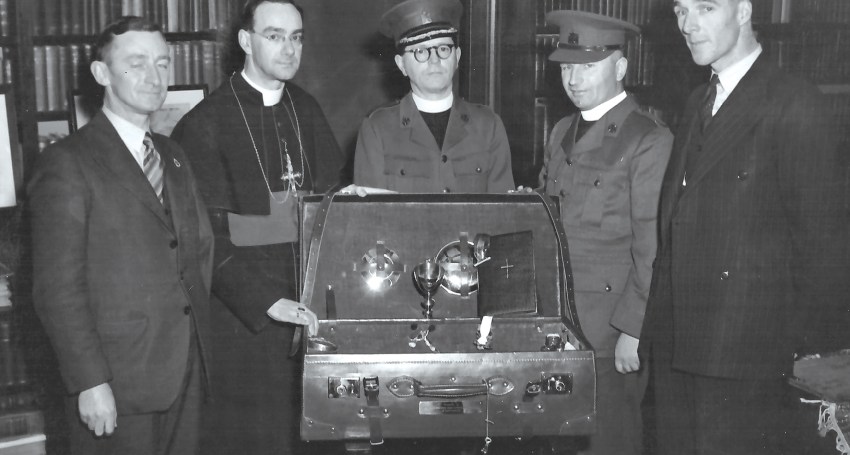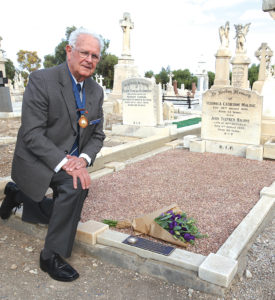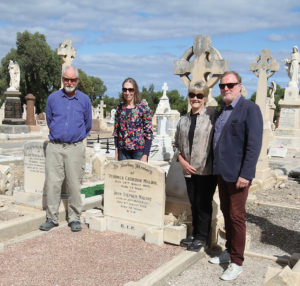Knights celebrate 100 years of service
Local
A gathering of 32 men in a room at the back of the Cathedral Hall was the early beginnings of an Order that has served the South Australian Catholic community with its good works over the past 100 years.

With strong interest shown by local lay men at the time, the South Australian Order of the Knights of the Southern Cross (KSC) was formed in 1922 under the guidance of inaugural Grand Knight, Jack Malone.
The principal motivating factor for the founding of the Order in Australia was to fight against the sectarian issues affecting the employment opportunities of Irish-Australian Catholics.
Paul Hawkes, who has written a book detailing the history of the Knights in SA, explains how in the early years they wanted to counter the influence being exerted by the Freemasons in the pursuit of jobs.
Advertisement
“The Freemasons were not overtly anti-Catholic but rather favoured their fellow masons in the employment market which, of course, disfavoured Catholics,” he said.
“The conviction amongst Catholic laymen in the 1920s was that ‘something had to be done’.
“One of the major motivations of the Order at this time was to assist fellow Catholics in their efforts to find work, advance their careers and other social needs, as well as providing mentoring or vocational guidance for those setting out on a career path after completing their education.”
Following the trend throughout Australia, the Order grew quickly in South Australia.
Initially, meetings were held in
St Joseph’s Church in Pirie Street, with social functions organised in the gymnasium at Christian Brothers College. In 1929 a new State office opened in Angas Street and by the following year there were
540 Knights registered. Membership continued to grow and in 1940 there were 11 branches operating in regional SA.
Following World War II, the Order reached its peak membership with about 2500 Knights regularly attending meetings across the State during the 50s and 60s.
Changing times, however, also saw an adjustment in the work of the Knights.
“The diminution of sectarianism against Catholics in the modern age triggered an ongoing need for the Knights to reassess their fundamental purpose,” Mr Hawkes explained.
“It was this reassessment which led to the shedding of secrecy surrounding the Order and the founding of Southern Cross Care by the Order in the mid-1960s, which is perhaps its most profound legacy.
“In these changing times the Order has provided annual Year 12 scholarships to city and country students, as well being heavily involved in many charitable endeavours, both on its own and in partnership with other Catholic organisations.”
In researching the history of the Knights, Mr Hawkes said he was struck by the “level of secrecy” employed by the Knights.
“The secrecy was not a surprise but it was interesting to note that the South Australian Knights fought very hard at a national level for more than 30 years to lift this secrecy,” he said.
“The SA Order was nonetheless faithful to the edict’s continued imposition until secrecy was finally lifted in the 1970s.”
Advertisement
Mr Hawkes added that while the meeting minute books of the Order were a “valuable” source of information, it was the correspondence and reports with the Adelaide Archdiocese – preserved and housed by the Archives department – that provided a “much more human balance” to the story of the Knights.
“In addition, researching the history through the pages of The Southern Cross was akin to a cryptic crossword,” he laughed.
“The KSC was not named in any issue between 1922 and 1972 and therefore much reading between the lines was required to ascertain information on the work of the Knights which was in fact plentifully, if obliquely, reported on.
“The work done on the home front by the Knights during the Second World War was particularly interesting and well reported on, without once mention of the Knights of the Southern Cross!”
Current KSC SA chairman, Don Campbell said the work of the Knights continued to remain true to the Order’s original five principal objectives namely:
- To promote the advancement of Australia.
- To foster the Christian way of life throughout the nation.
- To promote the welfare of its members and their families.
- To encourage spiritual, social and intellectual activities amongst its members.
- To conduct and support educational, charitable, religious and social welfare work.
“We have fundraisers that support Hutt Street Centre and Vinnies – but we are not just about cooking barbecues,” he said.
“The Knights are about supporting the community, trying to look after people in our community, particularly the priests.”
Today, with only 280 members in 17 branches across SA, Mr Campbell said increasing membership was the “biggest challenge” facing the Order. However, he was heartened that a new branch was recently formed at Clearview/Kilburn, with a strong representation from the Indian Catholic community.
“I think the Knights will need to look more to the multicultural communities for the future,” he said.
Reflecting on preparations for the centenary celebrations on the weekend of May 28 and 29, Mr Campbell said the organising committee had done a remarkable job considering the challenges posed by COVID restrictions.
While the planned Triennial conference had been cancelled, he was confident Knights from Queensland, Victoria and Tasmania may join locals at the celebrations.
Activities on the Saturday will include Mass at Our Lady of Victories Church, Glenelg, with the National Executive meeting and national AGM following via video conferencing.
On Saturday afternoon there will be tours to the Mary MacKillop Museum at Kensington and the gravesite of the inaugural Grand Knight in West Terrace Cemetery.
In the evening, the centenary dinner will be held at the Morphettville Racecourse, with Archbishop Patrick O’Regan giving the opening address. Mr Hawkes’ book, A Bold Story Well Proven: One Hundred Years of the Knights of the Southern Cross in South Australia will also be launched.
Sunday’s events will begin with 9am Mass in St Francis Xavier’s Cathedral, with local Knights participating in the service.
The Knights of the Southern Cross is the only Catholic lay organisation in Australasia which is designated as an Order and while it has no canonical authority its work is recognised as apostolic.
For more information go to www.sa.ksca.org.au
FOUNDER REMEMBERED

KSC State chairman Don Campbell at the blessing ceremony.
The gravesite of the first Grand Knight of the Knights of the Southern Cross (KSC) in South Australia will form part of a guided tour during the centenary celebrations.
Local knights will be able to pay their respects at the gravesite of John Stephen (Jack) Malone, who was passionate about the formation of the KSC in South Australia and served as the inaugural State chairman from 1922-1924.
In March, KSC chaplain Monsignor Rob Egar blessed a plaque which has been placed on the grave, and which is located in the Catholic section of West Terrace Cemetery.
Guests at the dedication ceremony included Mr Malone’s grandchildren – Kym, Louise and Jane Davey – and his grand-nephew, Gavin Malone, whose grandfather Terry took over as KSC SA’s second Grand Knight.
Addressing the gathering, current State chairman, Don Campbell, acknowledged the pressures faced by Mr Malone and his State Council in developing the Order in South Australia.
“Their work resulted in keeping men of the Catholic faith together as a team through the Objects of the Order, and by assistance to members, their wives and children in many different forms,” Mr Campbell said.
“One of these areas of assistance, and the original reason for existence of the Knights, was to fight for a fair go for Catholic men, where work was not easy to obtain, particularly after World War I, when discrimination against Catholics was common.
“I believe as Jack observes us from above today, he sees that his Order is still going, and he would feel very satisfied with his work.”

At the dedication ceremony, from left, Gavin Malone, Louise Davey, Jane Davey and Kym Davey.












Comments
Show comments Hide comments